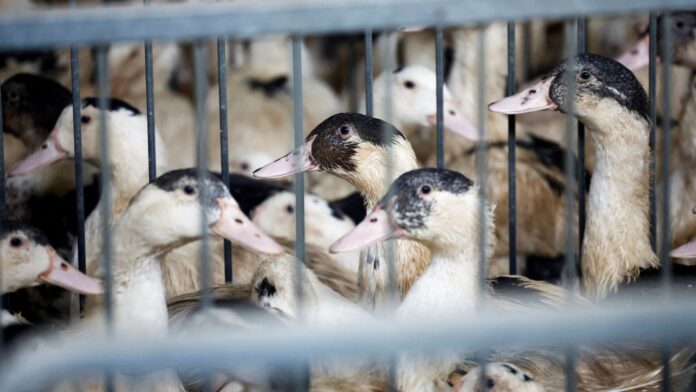In a significant move to combat the ongoing threat of highly pathogenic avian influenza (HPAI), French authorities have expanded and mandated its vaccination program for domestic ducks. In a recent paper titled “Duck vaccination against bird flu in France,” renowned researcher Hélène Banoun gives a thorough account of the careless mass avian influenza duck vaccination campaign.
The initiative now includes the use of self-amplifying mRNA vaccines and a mandatory third booster dose for ducks in high-risk areas.The French agriculture ministry has ordered that farm ducks in regions most susceptible to avian flu outbreaks receive a third dose of the vaccine. This decision comes in light of new scientific evidence supporting the efficacy of additional boosters. The mandate applies to farms with more than 250 ducks, collectively accounting for approximately 64 million birds across the country.
Two vaccines were indeed tested and approved for use in France’s duck vaccination campaign against H5N1 avian influenza.
Boehringer Ingelheim’s subunit vaccine
This is a traditional inactivated H5 subunit vaccine called Volvac B.E.S.T. AI + ND. It is administered in two doses, with the first dose given at 10 days of age and the second dose 18 days later. This vaccine uses a conventional approach to stimulate immunity against the H5 antigen.
CEVA’s self-amplifying mRNA vaccine
This vaccine, named RESPONS AI H5, utilizes innovative self-amplifying mRNA technology. It is encapsulated in ferric nanoparticles and contains squalene as an adjuvant. The vaccine requires precise storage conditions due to the nature of the mRNA technology.
Initilly, only Boehringer’s vaccine was approved because of logistical difficulties associated with CEVA’s storage requirements. In 2024, both companies sold doses to the authorities. The mRNA vaccine from CEVA poses significant concerns for food animals. Unfortunately, these concerns have not been addressed in pharmacokinetic or biodistribution studies that would typically accompany a biologic agent of this kind. In the absence of such data, we have squalene, a potentially toxic adjuvant, on which to base our risk assessment.
Vaccine Efficacy and Viral Shedding
The available evidence suggests that vaccination of ducks against H5N1 avian influenza reduces but does not completely eliminate viral shedding, which can continue for extended periods even in vaccinated birds.Studies have shown that vaccinated ducks can still shed the virus, albeit at lower levels compared to unvaccinated birds. In one study, vaccinated ducks challenged with H5N1 viruses exhibited reduced duration and titer of virus shedding compared to unvaccinated controls. However, some surviving ducks were found to shed virus for up to 17 days.
Risks of Vaccine-Induced Mutations
Vaccination can exert selective pressure on the virus, potentially leading to the emergence of more virulent or vaccine-resistant strains. This phenomenon has been observed in China with H5N1 avian influenza. As the virus circulates in vaccinated populations, mutations that allow it to evade vaccine-induced immunity may be favored, resulting in antigenic drift.
Breakthrough Infections on Vaccinated Farms
In late 2024, outbreaks in vaccinated flocks—including confirmed cases in Landes and Eure—occurred despite widespread vaccination. Strict containment measures, such as mass culling and trade restrictions, were put in place in the affected areas. Since the steps needed to contain outbreaks are similar to those taken prior to the start of vaccination campaigns, breakthrough infections damage the strategy’s credibility.
By July 2024, over 35 million ducks had received two vaccine doses, with 1.5 million having completed the full three-dose course2.Early results from the vaccination campaign appear promising. A study conducted in France showed a significant reduction in HPAI outbreaks, with a relative decrease of 95.9% attributed to the vaccination efforts2. This substantial decline suggests that the preventive vaccination strategy may be an effective tool in managing avian influenza, particularly in high-risk regions.However, the vaccination program is not without challenges.
Regulatory and Ethical Concerns
Even though the vaccine’s ATU (Temporary Use Authorization) only approved two doses, the French Ministry of Agriculture required a third dose for mulard ducks. The implementation of off-label dosing guidelines raises serious ethical and legal issues, putting producers and veterinarians at risk of legal action.
Broader Implications
The lack of international acceptance for poultry vaccination restricts French producers’ access to markets. Vaccination campaigns are still going on despite no indication that outbreak control has significantly improved. By adopting a strategy that is not backed by global best practices, France runs the risk of harming its economy and public trust.
There are serious ethical, legal, and scientific issues with France’s mandatory duck vaccination program: limited effectiveness of the vaccine due to ongoing viral shedding. Viral mutation risk brought on by vaccination pressure. mRNA residues in duck meat pose a risk to human health. breakthrough infections demonstrating the limitations of the campaign. Off-label vaccination practices: legal ambiguities.



